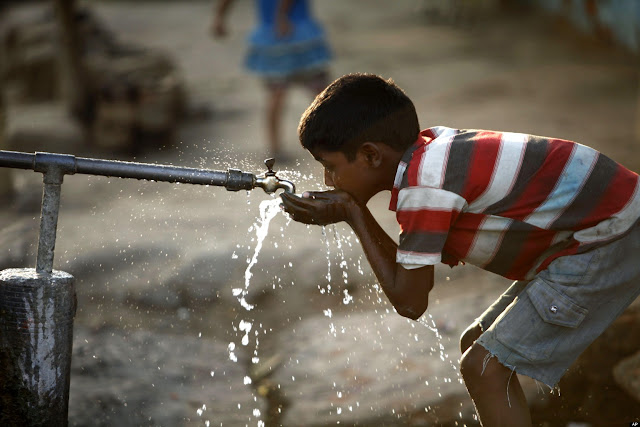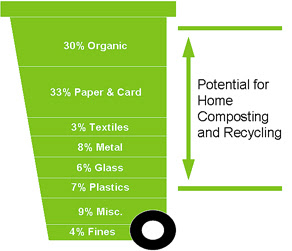Most children know some facts about the environment: they know
recycling is good, they know pollution is bad, and they know we need to take
care of the Earth if we want to continue living on it. What they may not know
is why recycling is good, how bad it could be if we didn't do it, and what
other problems there are on the planet that could lead to actions as important
as recycling. To give some context we have compiled a list of 50 facts and tips
about green living and environmentalism for kids. These are meant to give everyone a fresh
perspective of our world and exactly what it means to be green! Hopefully, with the help of our kids, we will
be able to turn all of our bad environmental practices into good ones.
Recycling
The average North American uses 700 lbs. of paper a
year. This equals approximately 465
trees per person, just for paper! Learn more.
Recycled paper only creates 25% of the pollution that new
paper creates when making it into new products.
Learn more.
A glass bottle will take 40,000 years to decompose if
it’s not recycled. Learn more.
Recycling a single aluminium can will save enough
electricity to power a TV for three hours.
Learn more.
The United States throws away enough
iron and steel to supply all auto-makers continuously. Learn more.
Recycle your newspaper.
The Sunday edition of the New York Times takes 75,000 trees to print. Learn more.
In 1993, the United States had more paper recycled than
was thrown into a landfill, the first year this landmark ever occurred! Learn more.
Recycling a single glass bottle will save enough energy
to power a light bulb for four hours. Learn more.
1987, California began a beverage container recycling
program. Today, they have recycled over
120 billion bottles and cans, enough to circle the Earth 375 times! Learn more.
 Plastic take 450 years just to begin decomposing. It takes another 50 to 80 years to be
completely decomposed. This also means
that every single piece of plastic even made has not even started to decompose. Learn more.
Plastic take 450 years just to begin decomposing. It takes another 50 to 80 years to be
completely decomposed. This also means
that every single piece of plastic even made has not even started to decompose. Learn more.
It only takes 25 recycled plastic bottles to make a brand
new fleece jacket. Learn more.
Enough steel and tin cans are thrown out daily in the
United States to make a pipe from Los Angeles to New York, twice. If a tenth of these cans were recycled, it
would equal 3.2 billion cans recycled each year. Learn more.
Only 1% of plastic shopping bags are recycled. Learn more.
Most plastic bags they go into landfills do not stay
there. They are caught by the wind and
enter trees, oceans, and other parts of nature.
Learn more.
When a newspaper is recycled, it takes only seven days
from to become a brand new newspaper! Learn more.
All newspapers in the United Kingdom at 100% recycled
paper. Learn more.
Many clothing companies now use recycled materials in
their clothes. Check their labels to see
if you’re buying clothes that were once something else! Learn more.
Reusing
 Just because you’re finished with a toy doesn’t mean that
another kid won’t enjoy it. Donating
your old toys is a great way to save the environment and make another child
happy. Learn more.
Just because you’re finished with a toy doesn’t mean that
another kid won’t enjoy it. Donating
your old toys is a great way to save the environment and make another child
happy. Learn more.
In one person’s lifetime, using a cloth bag will save
over 22,000 plastic bags! Learn more.
Just because you stopped wearing old clothes doesn’t mean
that someone else can’t benefit from it.
Donate you old clothes that are still in good shape to a shelter or
charity. Learn more.
The zinc in old cellphones can be used to build
ships. Learn more.
Your old video game consoles have gold. They can be recycled into new jewellery and
other fine items. Learn more.
Water
The Earth’s surface is 70% water, but many people go
without access to fresh water every day.
Turning the faucet off when you’re brushing your teeth and taking
quicker showers will use less water and leave more for others to use. Learn more.
Saving
 Turning your home’s thermostat down by a single degree
can save your family 8% in heating costs.
Learn more.
Turning your home’s thermostat down by a single degree
can save your family 8% in heating costs.
Learn more.
Using energy efficient appliances can save enough money
from less electricity usage that it can pay for the entire appliance! Learn more.
Every three months, people in the United States throw
away enough aluminium cans that they could rebuild all the airplanes in the
country. Learn more.
13 billion plastic bags are made every year, about 300
per adult. Use cloth bags to help reduce
the number of plastic bags made. Learn more.
 By recycling paper and cardboard, the United Kingdom is
able to save 11 million tonnes of greenhouse gas emissions from ever being
created each year! That equals the
exhaust of 3.5 million cars! Learn more.
By recycling paper and cardboard, the United Kingdom is
able to save 11 million tonnes of greenhouse gas emissions from ever being
created each year! That equals the
exhaust of 3.5 million cars! Learn more.
For every tonnes of paper recycled, 17 trees are
saved. Learn more.
Paper bags are not really better than plastic bags. Approximately 14 million tress are cut down
each year for paper bags. Remember to
use your cloth bags! Learn more.
The state of California spends $300 million just on
cleaning garbage from their beaches. Try
to do your part and pick up after yourself!
Learn more.
Science and Nature
1.6 billion people do not have access to electricity. Learn more.
 2.5 billion people do not have access to proper
sanitation. Learn more.
2.5 billion people do not have access to proper
sanitation. Learn more.
Almost 1 billion people don’t have
enough to eat. Learn more.
The United States generates enough
garbage each year that the garbage trucks used would stretch halfway to the
moon. Learn more.
Food scraps and other organic garbage creates methane, a
greenhouse gas 20 times stronger than carbon dioxide. Learn more.
The United Kingdom uses enough paper each year to
deforest an area the size of the country of Wales! Learn more.
What Can I Do
Remember to Reuse, Reduce, and Recycle. There is a reason we say these in this
order. We always want to reuse things
first. If we can’t, then we try to
reduce what we use. Recycling is the
final step where we give out old things to someone else to make new
things. Learn more.
Turn off the water when brushing your teeth. The more people who turn off water faucets
when not in use, the more water there is for emergencies. Learn more.
Turn of lights when you leave a room. If no one is in a room, there is no reason
for a light to be on. Learn more.
Play outside.
Video games and computers use a lot of energy and have you sitting all
day. Be active outdoors and use less
energy, have more fun, and be more fit! Learn more.
Print on both sides of the paper when using your
computer’s printer. You will only end up
using half the paper you normally do! Learn more.
A child will create 67 lbs. of garbage per year just from using a disposable lunch. Make your own lunches from home using reusable containers. Learn more.
For your school lunch, use a reusable lunch box and
thermos. Wash it at night and its ready
to go for tomorrow! Learn more.
Carpooling to school, extracurricular activities, and
friends’ houses will lower greenhouse gas emissions from vehicles. Learn more.
Start being a green kid now. The habits you create will last as you grow
up into an adult. Learn more.
Use a compost.
Over 30% of all garbage thrown away could go to better use in
composting. Learn more.
On average, people buy three new electronic devices each
year. Remember to recycle or sell your
old devices instead of throwing them in the garbage. Learn more.
Additional Sources: Scholastic, Arbor Day Kids, Stratham Library, Home Dental, Alcoa Recycling, Busch Systems, Africa, She Knows, Dewson School










